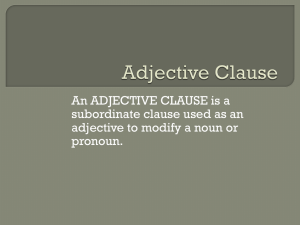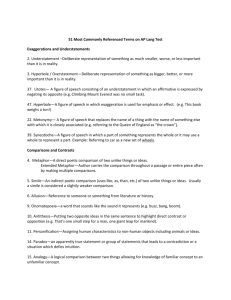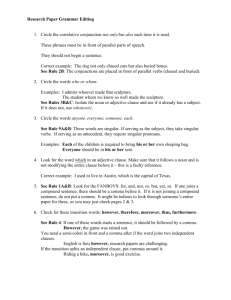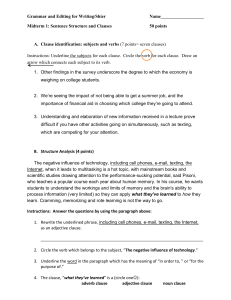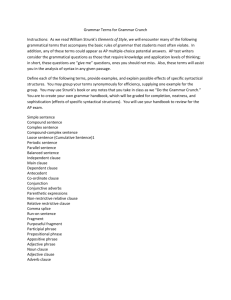Adjective Clause - jeffrey scott longstaff
advertisement
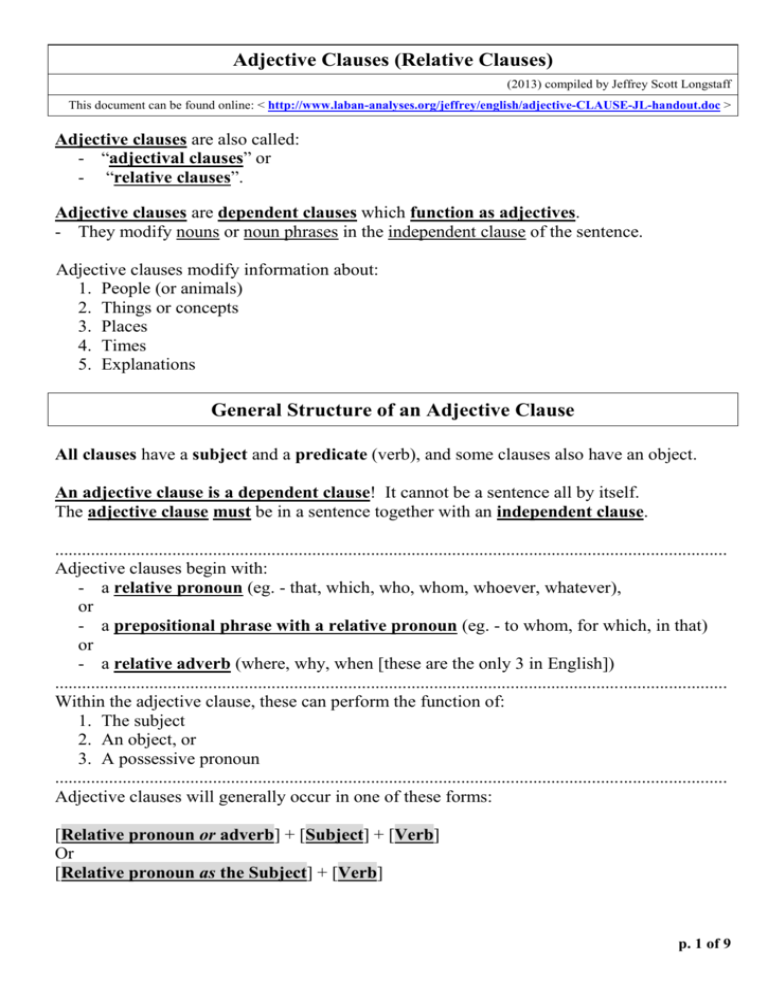
Adjective Clauses (Relative Clauses) (2013) compiled by Jeffrey Scott Longstaff This document can be found online: < http://www.laban-analyses.org/jeffrey/english/adjective-CLAUSE-JL-handout.doc > Adjective clauses are also called: - “adjectival clauses” or - “relative clauses”. Adjective clauses are dependent clauses which function as adjectives. - They modify nouns or noun phrases in the independent clause of the sentence. Adjective clauses modify information about: 1. People (or animals) 2. Things or concepts 3. Places 4. Times 5. Explanations General Structure of an Adjective Clause All clauses have a subject and a predicate (verb), and some clauses also have an object. An adjective clause is a dependent clause! It cannot be a sentence all by itself. The adjective clause must be in a sentence together with an independent clause. ..................................................................................................................................................... Adjective clauses begin with: - a relative pronoun (eg. - that, which, who, whom, whoever, whatever), or - a prepositional phrase with a relative pronoun (eg. - to whom, for which, in that) or - a relative adverb (where, why, when [these are the only 3 in English]) ..................................................................................................................................................... Within the adjective clause, these can perform the function of: 1. The subject 2. An object, or 3. A possessive pronoun ..................................................................................................................................................... Adjective clauses will generally occur in one of these forms: [Relative pronoun or adverb] + [Subject] + [Verb] Or [Relative pronoun as the Subject] + [Verb] p. 1 of 9 Two Main Types of Adjective Clauses There are two main types of adjective clauses: 1) Essential Adjective Clause Also called: - Restrictive Relative Clause - Restrictive Clause - Defining Relative Clause Essential adjective clauses add essential information to the noun (or noun phrase) being modified. The essential information can be described as “restricting” or “defining” the noun, and so this information cannot be omitted from the sentence, or the sentence would not make sense. Because the information is essential for the meaning of the sentence, commas are not used to separate the adjective clause from the main clause of the sentence. ..................................................................................................................................................... 2) Nonessential Adjective Clause Also called - Non-restrictive Relative Clause - Non-restrictive Clause - Non-defining Relative Clause - Can also be considered to be: o A parenthetical clause o An “aside” Nonessential adjective clauses add information to the noun (or noun phrase) being modified, but this information does not define the noun. Therefore, the information in the clause can be omitted from the sentence and the meaning of the sentence will be essentially the same. Because the information is not essential for the meaning of the sentence, commas are used to separate the adjective clause from the main clause of the sentence. The relative pronoun “that” is never used in nonessential adjective clauses. The relative pronoun “which” might be most preferred in nonessential adjective clauses. Examples Adjective Clauses Examples are organized here according to what kind of noun is modified: 1. People (or animals) 2. Things or concepts 3. Places 4. Times 5. Explanations p. 2 of 9 Adjective Clauses Modifying People (or animals) ..................................................................................................................................................... People (main clause subject) (adjective clause: relative pronoun as the subject) The man who lived next door was a criminal. [essential adjective clause] The girl who danced so delightfully was applauded by everyone. [essential adjective clause] Folks who are forgetful always tend to get lost. [essential adjective clause] My friend John, who called earlier, wants to come for dinner. [non-essential adjective clause] ..................................................................................................................................................... People (main clause subject) (adjective clause: relative pronoun as object – or, not the subject) The man to whom you spoke yesterday is my father. The man who you spoke to yesterday is my father The man you spoke to yesterday is my father [essential adjective clause: formal] [essential adjective clause: informal] [essential adjective clause: no pronoun] My friend, to whom I owe everything, is coming over. [non-essential adjective clause] That guy, who is my best friend, wants to meet you. [non-essential adjective clause] That guy, my best friend, wants to meet you. [non-essential adjective clause: no pronoun] ..................................................................................................................................................... People (main clause object) (adjective clause: relative pronoun as the subject) I can’t accept students who use phones during class. I can’t accept students that use phones during class. [essential adjective clause: formal] [essential adjective clause: informal] Caesar was a man who lived over 2000 years ago. Caesar was a man that lived over 2000 years ago. [essential adjective clause: formal] [essential adjective clause: informal] “She is someone who never lets me down.” “She is someone that never lets me down.” “Is there anyone here who can give me a ride home?” “Is there anyone here that can give me a ride home?” ??? [non-essential adjective clause] p. 3 of 9 ..................................................................................................................................................... People (main clause object) (adjective clause: relative pronoun as object – or, not the subject) She sent a text to the boy whom she had met at the party. [essential adjective clause: formal] She sent a text to the boy who she had met at the party. [essential adjective clause: informal] She sent a text to the boy she had met at the party. [essential adjective clause: no pronoun] Here is a man for whom I would do anything. Here is a man who I would do anything for. Here is a man I would do anything for. [essential adjective clause: formal] [essential adjective clause: informal] [essential adjective clause: no pronoun] That is the president to whom you have been listening! That is the president who you have been listening to! That is the president you have been listening to! ??? [non-essential adjective clause] ..................................................................................................................................................... People (main clause subject) (adjective clause: relative pronoun as possessive) The family whose car was ruined finally bought a new one. The movie whose director won a prize has become very famous. [essential adjective clause] [essential adjective clause] ??? [non-essential adjective clause] ..................................................................................................................................................... People (main clause object) (adjective clause: relative pronoun as possessive) A new car was given to the family whose old one had been ruined. [essential adjective clause] A prize was sent to that director whose move was so famous. [essential adjective clause] I know this girl whose dog is always barking. [essential adjective clause] Never trust a doctor whose office is dirty. [essential adjective clause] ??? [non-essential adjective clause] Adjective Clauses Modifying Things (or Concepts) p. 4 of 9 ..................................................................................................................................................... Things (main clause subject) (adjective clause: relative pronoun as the subject) Forgetting the receipt, which was a mistake, led to big problems. [non-essential adjective clause] [Gerund – acts like a noun] Clean water, which is so precious, is becoming scarce. [non-essential adjective clause] The party, which lasted all night, ended in the early hours of the morning. [non-essential adjective clause] ..................................................................................................................................................... Things (main clause subject) (adjective clause: relative pronoun as object – or, not the subject) Things that we throw in the garbage can often still be quite useful. [essential adjective clause] Hamburgers, which we all love, are the best food in the world. [non-essential adjective clause] Clean water, which people often waste, is becoming scarce. [non-essential adjective clause] The tree, which he loved, was cut down for firewood. [non-essential adjective clause] THESE LAST TWO ARE ADJECTIVE CLAUSES OF PLACE The theatre, in which many plays are shown, seats 500 people. [non-essential adjective clause] The theatre, where many plays are shown, seats 500 people. [non-essential adjective clause] ..................................................................................................................................................... Things (main clause object) (adjective clause: relative pronoun as the subject) We didn’t bring the receipt, which was a big mistake. [non-essential adjective clause] [ ?? JL – This one can’t be an adjective clause! “the receipt” was not a mistake!] [?? I think this has to be an adverb clause!] My friend John found a million dollars, which was a surprise. [non-essential adjective clause] ..................................................................................................................................................... Things (main clause object) (adjective clause: relative pronoun as object – or, not the subject) That store did not have the movie that I wanted [essential adjective clause] That store didn’t have the movie I wanted. [essential adjective clause: no pronoun: informal] This is the movie that my friend told me about. [essential adjective clause] This is the movie my friend told me about. [essential adjective clause: no pronoun: informal] p. 5 of 9 Adjective Clauses Modifying Places ..................................................................................................................................................... Places (main clause subject) (adjective clause: relative pronoun as the subject) The restaurant which had the worst food was closed down. [essential adjective clause: formal] The restaurant that had the worst food was closed down. [essential adjective clause: informal] [“Where” cannot be used as a subject in an adjective clause – must use “that” or “which”] ..................................................................................................................................................... Places (main clause subject) (adjective clause: relative pronoun as object – or, not the subject) The school where I used to go is closed now. The school I used to go to is closed now. [essential adjective clause] [essential adjective clause: no pronoun] The house where I used to live is gone now. The house I used to live in is gone now. [essential adjective clause] [essential adjective clause: no pronoun] ..................................................................................................................................................... Places (main clause object) (adjective clause: relative pronoun as the subject) This is the town that had a fantastic fireworks celebration. [essential adjective clause] [“Where” cannot be used as a subject in an adjective clause – must use “that” or “which”] ..................................................................................................................................................... Places (main clause object) (adjective clause: relative pronoun as object – or, not the subject) This is the town where a fantastic fireworks celebration was held. This is the house where I used to live. This is the house in which I used to live. This is the house I used to live in. [essential adjective clause] [essential adjective clause] [essential adjective clause: “which” after preposition] [essential adjective clause: no pronoun] JL additions to “which” below.... at end of this document.... TO BE ADDED! Life is hard in the desert, where animals struggle to find food. [non-essential adjective clause] It’s nice to live here, where we have everything that we need. [non-essential adjective clause] Everyone came into the classroom, where we all sat quietly. [non-essential adjective clause] p. 6 of 9 Adjective Clauses Modifying Times (days, dates, eras) ..................................................................................................................................................... Times (main clause subject) (adjective clause: relative pronoun as the subject) [essential adjective clause] ..................................................................................................................................................... Times (main clause subject) (adjective clause: relative pronoun as object – or, not the subject) [essential adjective clause: no pronoun] ..................................................................................................................................................... Times (main clause object) (adjective clause: relative pronoun as the subject) [essential adjective clause: informal] ..................................................................................................................................................... Times (main clause object) (adjective clause: relative pronoun as object – or, not the subject) My grandfather recalls times in his youth when everyone just listened to the radio. The news is usually mundane except on occasions when some great crime is reported. This village is such a quiet place, especially on Sundays when everyone attends church. We can’t wait until Saturday when we will go to the concert. Today is the day when you must seize this opportunity. [essential adjective clause] p. 7 of 9 Adjective Clauses Modifying Explanations ..................................................................................................................................................... Explanations (main clause subject) (adjective clause: relative pronoun as the subject) [essential adjective clause] ..................................................................................................................................................... Explanations (main clause subject) (adjective clause: relative pronoun as object – or, not the subject) The reason why he was late was not believable. The reason that he was late was not believable. [essential adjective clause] [essential adjective clause] The reason why we do it is to have a great time! [essential adjective clause] The reason why I’m late is that missed the bus this morning. [essential adjective clause] ..................................................................................................................................................... Explanations (main clause object) (adjective clause: relative pronoun as the subject) [essential adjective clause: informal] ..................................................................................................................................................... Explanations (main clause object) (adjective clause: relative pronoun as object – or, not the subject) The high pay is the main reason why I really want that job! The high pay is the main reason that I really want that job! [essential adjective clause] [essential adjective clause] Please tell me the reason why you are late. [essential adjective clause] That is the true reason why I really want to go. [essential adjective clause] [Are there other nouns for “reason” that can be used?] ..................................................................................................................................................... ADD THESE – all of these are variations of adjective clauses + preposition from which upon which within which p. 8 of 9 at which on which under which above which of which with whom above whom p. 9 of 9

